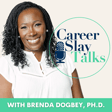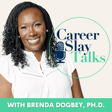Become a Creator today!Start creating today - Share your story with the world!
Start for free
00:00:00
00:00:01

018: Advice to my younger self - 30s
In this episode, I share what I would have said to myself in the 30s and how I would have navigated the 30s in hindsight. Of course hindsight is 20/20 - there are many different ways i would have navigated motherhood and career. If this episode resonated with you please rate the podcast and of course share!
Transcript
Introduction to Black Canadian Professionals
00:00:00
Speaker
Hello and welcome to another episode of the Curiously Talks podcast. My name is Brenda Dalby and in this podcast I center Black Canadian professionals and the African diaspora, but of course anybody and everybody is welcome to follow along on this journey.
Advice to Younger Self in 30s
00:00:17
Speaker
So today I want to share with you advice that would give to my younger self 30s edition and I had shared a really short episode on advice to my younger self 20s edition and today I wanted to take the time to think a little bit around what would I say to my to my younger self
00:00:37
Speaker
in my 30s. As you know, if you've been following along, I'm in my mid 40s now, feel strange to say that, but there's few things that you learn along the way.
00:00:47
Speaker
And I'm really hoping to share a few, I don't know, perspectives, nuggets of wisdom. And I hope that that speaks to one another.
Societal Pressures in 30s
00:00:55
Speaker
By the time I was dating and getting ready to get married, almost all of my friends were already married. And I think 28 was a very interesting year for me. Basically every single person that I knew was expecting.
00:01:09
Speaker
when i was 28 so i have a whole group of nieces nephews friends as kids who are all turning 16 this year because 28 was the year and i remember just kind of like this panic for lack of a better word
00:01:25
Speaker
as I was approaching my 30s because so a lot of folks had their first kids at 28 when I was 28. And then two years later, folks were already in their second round of kids. And I was not really seeing anybody inside at that time. And I just remember feeling just like time was not on my side. So if I look back, I would say, and if you're in that season right now, I would say take the pressure off yourself. And there's a lot of
00:01:54
Speaker
pressure and not just from yourself as an individual, societies, they're kind of telling you, well, the clock is ticking. There's all these reminders. And so I think one of the things that I would say to my younger self was just ease off the pressure and own your journey.
Owning Your Journey vs. Timelines
00:02:14
Speaker
And this particular one, I want to emphasize a little bit more on what it means to own your journey. I found that in my 30s, you are in such different seasons.
00:02:23
Speaker
So there's folks who got married in their early 20s and mid 20s and started families early. So by the time they're in their 30s, they have teenagers. I had friends who were just like myself, just getting married at 30, give or take.
00:02:39
Speaker
I had friends who'd gotten married later on. So the folks who got married at 35 and basically people weren't are in such different seasons and the thing I think about your 20s is that you know you come from high school generally you go to university or college or whatever you're still in this cohort where after that then you get your job and then folks start to get married and then folks start to have kids and I think when you get to your 30s I just found that everyone is in such different seasons and so
00:03:08
Speaker
this idea of being in a cohort where by now we should all be buying houses or settling down etc just life happens and life happens in very different ways for different people and so i think really owning your journey and not trying to rely on your peers to figure out where you need to be
00:03:26
Speaker
I think was really really important because again throughout your 30s so many different things happened. We lost friends who were in their 30s who had cancer really young. I have friends who became widowed or a widower. So there's so many different things going on in that season and trying to be in a cohort I think I found was just
00:03:47
Speaker
So challenging.
Aligning Work with Life Seasons
00:03:49
Speaker
The other thing I would say is to align your work with your seasons and not the other way around. And for me, the 30s were the season where after getting married, I had kids, I had young children.
00:04:04
Speaker
And it was so, at some point I remember I did not want to take on more responsibility just because the juggle was so real. And 30s for me were that season where you're in the trenches, where you're doing daycare drop-offs. And this was pre-COVID. So the idea of working remotely was not even an option. And so basically it was this season that's just go, go, go fast, fast, fast, you wake up.
00:04:32
Speaker
You put the kids in snow pants and snow suits, and they needed me so much in that season. And so the thought of then having to also be responsible for people emotionally at work was just something that I personally chose not to do. And I think different people navigate those seasons differently. And so from a career perspective, for me, I made a couple of lateral moves
00:04:57
Speaker
in my thirties and that was because I wanted to really lean in on my professional experience as opposed to trying to get a promotion or trying to climb up quickly and that was a personal choice and I think different people are in different seasons in different ways and can handle those seasons differently as well for me
00:05:16
Speaker
What that meant was that I really just needed to focus on keeping my kids alive and well. And what that meant professionally was that I leaned into being a subject matter expert and dug deeper in my experience. And like I said, I made a couple of lateral moves where I ended up doing the same kind of work
00:05:40
Speaker
in a different organization. And because that work for me came easily, it helped me manage the workload and it helped me manage. So I think that's one of the things for you to keep in mind is just what season are you in? For some people, the 30s are the season where you're taking care of family. So not just young children, but you also may be taking care of elderly parents. And that's more so a reality for me in the 40s.
00:06:06
Speaker
where again my parents are in their eighties, late seventies and so you're in that caregiver role and then you have to think about how does that pan out for your other responsibilities.
Redefining Yourself at Any Age
00:06:19
Speaker
The other thing I would say about the thirties is it's okay to not have it all together.
00:06:25
Speaker
And this idea that someone just has it all together is just, it's weird because again, what it means to have it all together is not the same thing for any two given people. And I think folks think that by 30 you should have it all figured out, which is kind of ridiculous if you think about the fact that our life expectancy is in the 80s.
00:06:48
Speaker
or the 90s, if you're blessed to live that long. So 30, you're just a third way through your journey, and yet somehow you're supposed to have all these answers. And so it's okay not to have all the answers, and it's okay to not have it all figured out. A lot of people define and redefine themselves in their 30s, in their 40s, in their 50s, in their 60s. And so this idea that you somehow got to lock in
00:07:17
Speaker
on where your career path is going. For me, it doesn't make sense. And I really encourage you to just be open-minded enough to continue exploring. And remember that 30 is still young. When I look back, I felt like, oh, my gosh, I'm so old. I'm 30. And now that I'm in my 40s, I'm like, well, actually, 30s were still young.
Avoiding Burnout and Taking Breaks
00:07:38
Speaker
Couple of other thoughts that I would remind myself for that season is to stop running on fumes.
00:07:49
Speaker
Can I just pause there? Stop running on fumes. I remember in my 30s just depleting myself to the point where I was literally running on fumes, not running on gas, not running on empty, but like running on clouds of fumes. And I think because your body is still
00:08:09
Speaker
young, you think that you can get away with it. But the truth of the matter is your body is going to pay for that further down the line. And I really, for me, I did that to the point where then I crashed and I burned and it was not pretty. And so just being really cognizant of pre-burnout and slamming those breaks before you actually get all the way to full on burnout is really, really, really important.
00:08:35
Speaker
and taking breaks because I found again, that season was where I was in the full trenches with small children. As a young family, running a household is a full-time job. Taking care of children is a full-time job.
00:08:49
Speaker
Working full-time is a full-time job. And somewhere in there creating room for your spouse, your partner, and other friends, it's a lot. And so in that season, I think one of the things that's really important is to try not to run on fumes if that means you really have to curve out that time for yourself and make it happen because it doesn't happen organically. And a lot of the time, if you're not intentional about it,
00:09:17
Speaker
you will deplete yourself so much before you actually realize that you need to fill the cup again. And especially for us as women, as Black women, this idea of being this strong Black woman, no, it's a soft life. Take that self-care really, really, really seriously.
00:09:35
Speaker
and just curve out the time for yourself.
Self-Care and Family Modeling
00:09:40
Speaker
The other interesting thing about the 30s is that some friendships survived my 30s, some didn't. I remember in the 30s just feeling like, will I ever remember who I was before having children?
00:09:54
Speaker
before just being so encompassed and busy. And I'm speaking specifically from a perspective of children because that was my reality. Just this idea like you've lost yourself because you're giving so much of yourself to so many other people. You forget who you are for yourself. And I think the advice I'd give to my younger self is that it gets better and you're going to have time to connect with friends again. And I found like my 40s have been really, really
00:10:23
Speaker
fun in that regard, where I don't have very small children, because my kids are still young, like eight-year-olds and ten-year-olds, but they're old enough that I can guilt-free make a date with a girlfriend and meet up and not feel just this pressure to always be home alone in the house. And I think I wish I did more of that, actually, because I think I would have been the better for it. And there's this sense of just self-sacrifice.
00:10:51
Speaker
everything for the better of your family? I don't think so. I think actually you want to model being able to take good care of yourself because I think your family, especially your children, they need to also see that so that we also break this cycle of this idea of just have to be on the go all the time.
00:11:11
Speaker
You have to be out of this mule. The other reminder I would have for myself is just stop trying to do it all by yourself. And this maybe is more based on my personality, just this idea that you can do it all, you know, and just trying to juggle it all. I think I put a lot of pressure on myself personally, but also I could have done a better job at seeking help.
00:11:34
Speaker
And maybe on that one, I'm going to dig a little deeper. If there's something I wish I did, I wish I paid for help and, you know, budget, right? So sometimes it's not as simple as doing just pay for it. Like sometimes you don't actually have the funds. But I really do wish that in that season where my kids were really, really small and it was so demanding.
00:11:54
Speaker
I spent a lot of time just lamenting the lack of a village, the lack of, and everybody's busy, everybody's doing their thing. And it was a really tough season for me, if I can open up a little bit, because it was just, it was not how I had envisioned it. You've heard me share before that I was born and raised in Kenya. I've been in Canada all this time. You don't realize how much you build
00:12:20
Speaker
a vision for how you want things to work out in terms of family. And I always thought that I would be surrounded by my folks, family, et cetera. And I don't think I'd fully internalized what it meant raising kids out here in Canada away from my family and what I considered my village. And so in all of that, I spent a lot of time just lamenting that I didn't have the village.
00:12:48
Speaker
when I think there's in some ways I could have paid for that. I wish I actually paid for a regular sitter just to have that time out either to myself or with my husband just to go on a date.
Outsourcing Help for Mental Health
00:13:01
Speaker
And at some point, actually towards the end of my thirties, we did that and it was
00:13:05
Speaker
phenomenal, like we'd have a date night once a week, and we need to go back to that. So this is a good reminder. But it was something that I wish actually just did was paid for it. I wish I outsourced more. And it doesn't have to be, you know, I think with some intentionality, I could have done it. So it's not just about having the money, but or not having the money. But I think
00:13:30
Speaker
with some intentionality, I think I could have found either paid for somebody to either clean house or take a portion of whatever it was that I was trying to overdo in that season. And rather than lament not having these kind of free people, I wish I actually just budgeted
00:13:50
Speaker
for it and plan for it. And I would have done that and I would have done that from earlier on because I think it would have really helped my mental health in that season in a big, big, big way. The last thing I'll say is that is embracing friendships from people of multiple generations.
Value of Intergenerational Friendships
00:14:09
Speaker
I think what's interesting about the 20s is that you're all like 20s, you're young and you're all like in the same season. And I find that the 30s
00:14:20
Speaker
different people come into your life for different reasons. Sometimes the most unexpected people are the ones who stay, who help you out, who come through for you. And I remember this friendships where, you know, you kind of banked on it so much and they weren't actually the ones, you know, like there's this saying, a friend in need is a friend in need. In those hours of need came from the most unexpected places. And I wish I had embraced that more.
00:14:47
Speaker
But I definitely, something that I do now, even in my 40s, is really embracing friendships at multiple ages and multiple levels. Like it's so amazing to still have some of the Gen Z friends who are kind of opening your eyes up to the world in a very different way. The other friends who are in their 30s are bringing me a completely different perspective, but also older friends. And there's so much wisdom in there.
00:15:14
Speaker
And there's so much richness, like in terms of their perspective and all the things that they've been through already. So I would say just really embracing friendships at multiple levels. Making friends at work. So this one's tricky, right? Like this is careers they taught. So we talk about career and stuff.
00:15:32
Speaker
I've made some really neat friends at work and I think for me often again as a Black woman you don't have your guard fully down at work, you don't know whether you're gonna you know what I mean like how you relate to different people again if your workplace is not that diverse you know but I made some really good work friends who to this day we still get together
00:15:56
Speaker
either for dinner, for drinks, for a chat, and those work friendships. There's some really deep work friendships, either for people who are also in the trenches with small kids when we're dealing with the same thing, or just a really understanding boss who became a great co-worker and friend.
00:16:15
Speaker
that has been so precious to me. And I think the 30s, I think in the 20s, I don't think I appreciated as much the beauty of building these meaningful relationships and friendships with people. And in my 30s, I feel like that was something that I really leaned in and just made the most of.
Avoiding Comparisons and Personal Growth
00:16:33
Speaker
So I think I'm gonna stop there and just say the one last thing I will say, comparing and envying.
00:16:41
Speaker
There's people who had lavish weddings in the 20s and some in the 30s who from my perspective in the 40s, some of those marriages did not make it. And it's just to say, don't waste your time envying people. Get to know what your own goals are.
00:17:01
Speaker
and work towards them and compete against you and you only. Because some of those folks who seem like they had it all going on, there's some people who passed away through breast cancer, completely nothing to do with their own volition. And there's folks who, again, have been through a lot.
00:17:22
Speaker
in the seasons. And so I think the 20s, there's all this, I felt a lot of pressure looking at others, trying to figure out your own voice. And I would say owning your voice in the 30s is probably, and as early as you possibly can, it's one of the most powerful things you can do for yourself because it's really going to help shape you and help you stay grounded, stay focused. For me, the parting words that I will have, like for me, my faith,
00:17:50
Speaker
was so grounding for me in the in the 20s and even more so in the 30s as a mother like a lot of that spiritual grounding and strength came from my faith and and when no one was there when the village was in there I knew that I could always depend on my faith as a grounding and as an anchor
00:18:11
Speaker
And I think it's something that's important for you to hold on to, even as you're navigating these waters, and as you're getting through this season into the next season. It's just something to keep in mind, but also to be grounded on, so that you're not looking on who's doing what. On social media, to be quite honest, I was actually, I wasn't on social media as much in my release as I was.
00:18:37
Speaker
as I am now in my 40s. I found that was good because in comparison, teeth of joy. Comparison is the teeth of all joy. And so just not trying to, oh my gosh, by this time I should and this person's doing that, just keep focused on yourself and on your journey and where it is that you're trying to go and the rest will follow.
00:18:59
Speaker
I hope you enjoyed this episode. Please like and follow the podcast on social media at KoreaSlay. Talks on Instagram and let's slay together.





